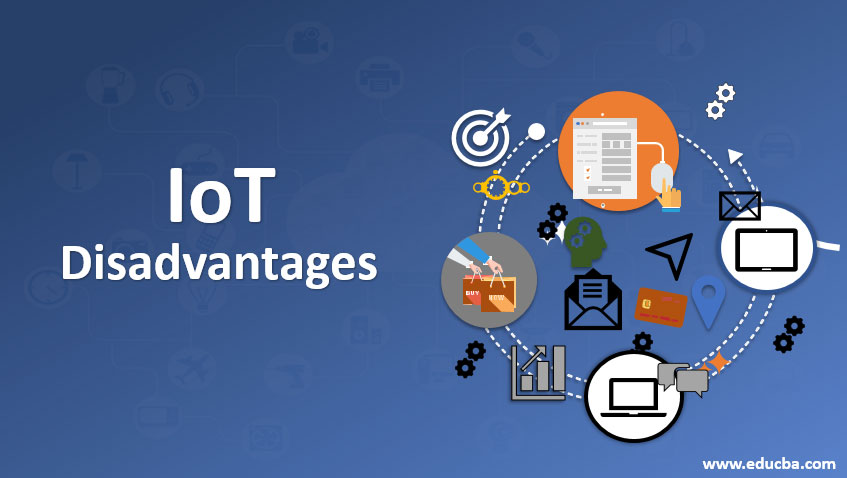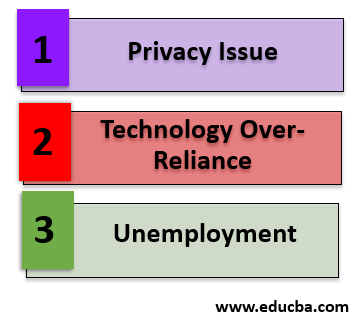Updated May 26, 2023

Introduction to IoT
IoT is a vast network where computers or nearly anything with an IP address are interconnected, enabling the automation of tasks and minimizing the need for human intervention. The devices can be mobile phones, lights, watches, television sets, factory machines, automobiles, etc. That can have a computer chip configured and software and electronic sensors embedded. With numerous advantages IoT provides, breach of privacy, over-reliance on technology, and job losses are three of the main concerns accompanying the Internet of Things. let’s see the IoT Disadvantages.
IoT Disadvantages
Below mentioned are the disadvantages of IoT:
1. Privacy Issue
- Technology and social media advancements have made users’ data constantly available on the Internet, providing hackers with another tool to break into networks and steal information. One might want some personal space in life, so it’s not easy to always stay connected with family and friends and give them every aspect of our life operation. There is a high possibility that your data can be misused.
- Cybersecurity organizations have implemented several precautions and protocols to prevent unauthorized access and misuse of personal data. However, there is always a loophole in the technology that hackers can exploit. For instance, an anonymous hacker group broke into government databases and leaked classified information to the public.
- The government’s highest level of security precaution failed to protect the data, resulting in an infringement of the security framework. Hackers can potentially gain unauthorized access to our online-stored information and extract detailed information about people’s lives, making it vulnerable to hacking.
- Users’ data can potentially be exploited by companies granted access, leading to potential misuse of information. This is a growing mishap happening all the time inside companies. Recently, Google faced accusations of utilizing users’ private information for the company’s benefit.
2. Technology Over-Reliance
- Today’s generation has everything available and accessible at their fingertips. Whether it’s information from Google or a previous episode of Game of Thrones, one can easily access the data and media on the go. Performing simple math equations involving addition and subtraction can now be easily accomplished through readily available calculators on our devices. With the advancement in IoT, people depend too much on technology to accomplish everyday tasks such as turning the lights off or driving the car.
- Few researchers claim IoT advancement will finally make a man unwilling to work or use energy. Nevertheless, relying on technology daily could lead to devastation by making decisions through the information it gives up. There is no robust, fault-free system. We see failures constantly occurring in technology, involving the Internet in particular. The more we entrust and focus on the Internet; if we lose it, there will be more likelihood of a potentially negative scenario.
- The Internet of Things will eventually cause all the personal data one owns available on the Internet, and every other device interconnected to it. Everything a user does at home can be easily tracked. When one is getting up, sleeping, going to the office, or moving inside or outside, IoT devices know all that, as well as those behind these devices and services (organizations).
- IoT devices work automatically, meaning they will keep telling you until you’re not getting up or ready for the daily tasks. It means that IoT devices will tell you to do that or that. Devices will dictate your daily lifestyle and control almost everything, including food and liquid intake, through regular alerts on your phone.
3. Unemployment
- More and more devices interconnected amongst themselves and to the Internet will lead to a lower need for manpower and, eventually, loss of jobs. IoT and AI will promote the automation of every work that requires manpower. Chatbots perform most of the work in automated customer support jobs. Automation will have a devastating impact on low and medium-skilled workers.
- The jobs of the people working in warehouses as inventory evaluators will be at stake because devices can communicate with each other and update inventory information to the owner regularly. Today we are seeing a decline in jobs because of robotic machines that operate automatically in the grocery checkout line and even ATMs.
- Nearly every sector expects IoT technologies to change business operations fundamentally. We can already see the impact of IoT on many sectors, and undoubtedly there are compelling reasons to believe forecasts that in the not-too-distant future, an increasing number of jobs will become redundant. Before panicking, it is essential to realize that the fact is balanced by the growing demand for individuals with completely new skills, as emerging roles are being created in companies due to technological advances.
- According to research ‘Future of employment’ by Oxford University academics, estate agents, telemarketers, dental assistants, and chefs are among the top 15 positions most likely to be automated. The evolution of the Internet of Things (IoT) is expected to significantly impact people’s daily lives and substantially change how businesses operate.
Conclusion
Advancements in the Internet of Things will benefit human beings in many ways, but everything comes with a cost. Security, over-dependency on technology, and job insecurity are significant disadvantages of the Internet of Things. With time and effort, governments across the globe are working towards overcoming these disadvantages and utilizing the IoT to its full potential.
Recommended Articles
This is a guide to IoT Disadvantages. Here we discuss the three main concerns of IoT disadvantages like Privacy Issues, Technology Over-Reliance, and Unemployment, respectively. You can also go through our suggested articles to learn more –

